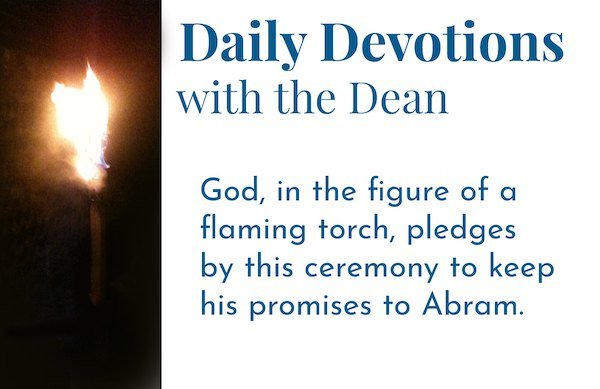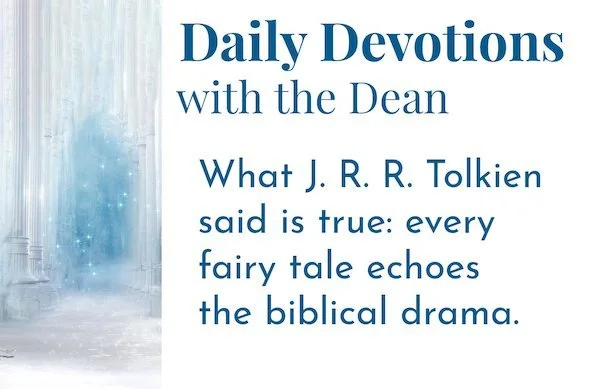Tuesday • 1/27/2026 •
Tuesday of 3 Epiphany, Year Two
This morning’s Scriptures are: Psalm 45; Genesis 15:1–11,17–21; Hebrews 9:1–14; John 5:1–18
This morning’s Canticles are: following the OT reading, Canticle 13 (“A Song of Praise,” BCP, p. 90); following the Epistle reading, Canticle 18 (“A Song to the Lamb,” Revelation 4:11; 5:9–10, 13, BCP, p. 93)
Welcome to Daily Office Devotions, where every Monday through Friday we draw insights from that day’s Scripture readings, as given in the Book of Common Prayer. I’m Reggie Kidd, and I’m grateful to be with you this Tuesday in the Third Week After Epiphany. Our readings come from Year 2 in the Daily Office Lectionary.
Let’s start with Hebrews 9. The writer to the Hebrews shines a light on the temporary nature of all the sacrifices that preceded Jesus’s: “For if the blood of goats and bulls, with the sprinkling of the ashes of a heifer, sanctifies those who have been defiled so that their flesh is purified, … (Hebrews 9:13). With these sacrifices, incomplete and imperfect as they are, the Old Covenant shows its leaning towards “a making right of all things” (Hebrews 9:10’s kairou diorthōsis).
With Christ, that time has come! At bottom, that which most fundamentally had to be “made right” was our consciences, our capacity to reflect on who we are, literally, our “co-knower” (Latin: con-scientia; Greek: sun+oida). No matter how hard we tried to mute them, our consciences constantly shouted out to us that we are guilty and shameful.
Image: From "Flaming Torch 4" by invisible_al is licensed under CC BY-NC-SA 2.0
Now, let’s go to Genesis 15. Between them, the 15th and 17th and 22nd chapters of Genesis present a powerful triptych of the future “making right of all things” that constitute the Bible’s story.* In Genesis 15, God shows his utter commitment to restore us to new life; in Genesis 17, Abram answers in kind by dedicating his life to God. In Genesis 22, God provides a solution to the problem of Abram’s (and our!) inability to live up to his (and our!) end of the covenantal relationship.
In the logic of Ancient Near East ceremonies of “cutting a covenant,” God himself, under the figure of a flaming torch (a theophany), walks the path between pieces of slaughtered animals in Genesis 15:9–11. In the symbolic language of the ceremony, God is saying, “By my own life, I pledged thee my troth. May what has happened to these animals happen to me if I fail to keep my promise to you, Abram.”
In Genesis 17, God calls forth from us a response of utter commitment in return; there, by the cutting of his foreskin, Abram will likewise proclaim: “By my own life, I pledge Thee my troth. May I myself be cut off from the land of the living if I fail to keep covenant with you, Yahweh.” (We will treat that in Thursday’s Devotional)
In Genesis 22, God offers a vision of his own solution to the problem of the perfection of his promises, and the imperfection of our response, by staying an execution and providing a substitute in death. (We will treat that in next Wednesday’s Devotional.)
In so many ways, the book of Genesis conveys God’s promises—the promise to Eve of a son to crush the serpent’s head, the promise of an olive leaf and a rainbow. Now, in Genesis 15, a flaming torch (God’s own presence) passes between pieces of slaughtered animals (pointing to the Cross). In the symbolic language of Ancient Near Eastern covenant ceremonies, God is saying he is ready to give up his own life to make his promise to Abram of a vast family come true. Amazing grace, how sweet the sound!
… And back to Hebrews 9. The Old Covenant’s constant offerings of animals and of sprinkling worshipers with the shed blood of those animals—all of it was a promissory picture. The entirety of the sacrificial system pointed forward to a singular offering and sprinkling that would make people not merely externally and ritually clean, but internally and definitively pure, altogether free from fear of judgment and disgrace. Convinced that despite everything we know about ourselves, and despite everything we know God knows about us, God’s love in Christ has reached down and made us clean: “…how much more will the blood of Christ, who through the eternal Spirit offered himself without blemish to God, purify our conscience from dead works to worship the living God!” (Hebrews 9:14).
Be blessed this day,
Reggie Kidd+
* Following the analysis of Meredith Kline in his By Oath Consigned.














